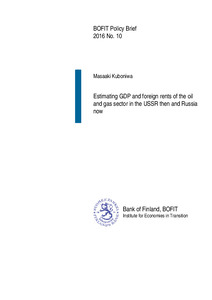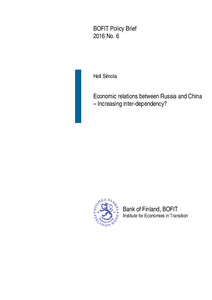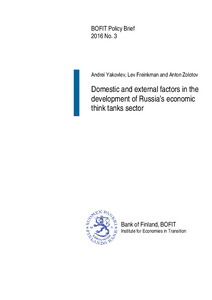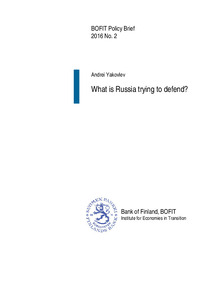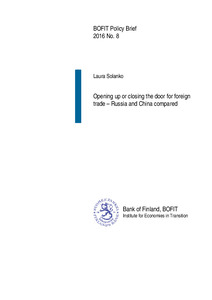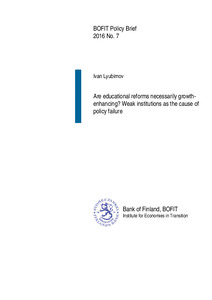Haku
Viitteet 1-10 / 11
Estimating GDP and foreign rents of the oil and gas sector in the USSR then and Russia now
(10.11.2016)
BOFIT Policy Brief 10/2016
BOFIT Policy Brief 10/2016
A Soviet legacy for present-day Russia is found in its resource dependency as well as its implicit exposition of resource rents from foreign trade in the national accounting. Estimating rents from the foreign trade of oil ...
Economic relations between Russia and China – Increasing inter-dependency?
(06.09.2016)
BOFIT Policy Brief 6/2016
BOFIT Policy Brief 6/2016
The economic cooperation between Russia and China has increased notably during past couple of decades, although from a very low level. Despite the increase, economic dependency between countries remains relatively low and ...
Domestic and external factors in the development of Russia’s economic think tanks sector
(27.04.2016)
BOFIT Policy Brief 3/2016
BOFIT Policy Brief 3/2016
This paper considers the development and current state of Russia’s think tank sector. As in Eastern Europe, international technical assistance played an important in development of Russian think tanks in 1990s. However ...
What is Russia trying to defend?
(21.01.2016)
BOFIT Policy Brief 2/2016
BOFIT Policy Brief 2/2016
Contrary to the focus on the events of the last two years (2014–2015) associated with Crimea and military conflict in Eastern Ukraine, I stress here that serious changes in Russian internal politics (with strong pressure ...
Nowcasting of Russian GDP growth
(10.06.2016)
BOFIT Policy Brief 4/2016
BOFIT Policy Brief 4/2016
Statistical agencies release their preliminary estimates of quarterly GDP growth with a publication delay that ranges from four to eight weeks. Given this lack of timeliness, nowcasting methods have been developed to produce ...
Opening up or closing the door for foreign trade – Russia and China compared
(18.10.2016)
BOFIT Policy Brief 8/2016
BOFIT Policy Brief 8/2016
The phenomenal economic growth in China and relative decline in Russia have made these two emerging economies more similar during the last quarter of the century. Both are large, middle-income countries dependent on foreign ...
Considerations on new Rosstat data on the contribution of Russia’s military goods sector to GDP growth in recent years
(02.12.2016)
BOFIT Policy Brief 11/2016
BOFIT Policy Brief 11/2016
This policy brief considers the newly clarified contributions of the military goods sector to economic growth in Russia from 2011 to 2015. The discussion is based on Rosstat’s recently released official data on disaggregated ...
BOFIT Venäjä-tietoisku 2016
(23.06.2016)
BOFIT Policy Brief 5/2016
BOFIT Policy Brief 5/2016
Kesäkuussa 2016 järjestetty BOFIT Venäjä-tietoisku kartoitti Venäjän kehityksen ajankohtaisia aiheita. Tähän julkaisuun on koottu tietoiskun neljän esityksen keskeinen sisältö lyhyinä artikkeleina. Ensimmäinen artikkeli ...
Are educational reforms necessarily growth-enhancing? Weak institutions as the cause of policy failure
(29.09.2016)
BOFIT Policy Brief 7/2016
BOFIT Policy Brief 7/2016
In this short paper, we emphasize the importance of reforms sequencing and discuss it in the context of potential educational and institutional reforms in Russia. As weak institutions correspond to a more binding constraint ...
Arktisen alueen taloudellinen merkitys Venäjälle rajallinen
(02.11.2016)
BOFIT Policy Brief 9/2016
BOFIT Policy Brief 9/2016
Venäjän arktisten alueiden merkitys koko maan talouden kannalta rajallinen, mutta siellä on merkittäviä luonnonvaroja ja Venäjällä alueita pidetään tärkeinä kansallisen turvallisuuden näkökulmasta. Venäjän arktisilla ...
